Caspian Policy Center Hosts London Conference on Energy Security and Post-COP29 Strategies
Recent Articles
Author: Caspian Policy Center
12/05/2024
London, December 4 – Today, the Caspian Policy Center (CPC) held its Caspian Energy Security and Post-COP29 Conference in London. The event brought together prominent voices from the United Kingdom, the European Union (EU), Caspian countries, and energy and climate experts to discuss evolving energy security challenges across the regions. A significant focus of the discussions was the implications of the Baku COP29 outcomes, as this marked the first time a COP Climate Summit was hosted in the region.
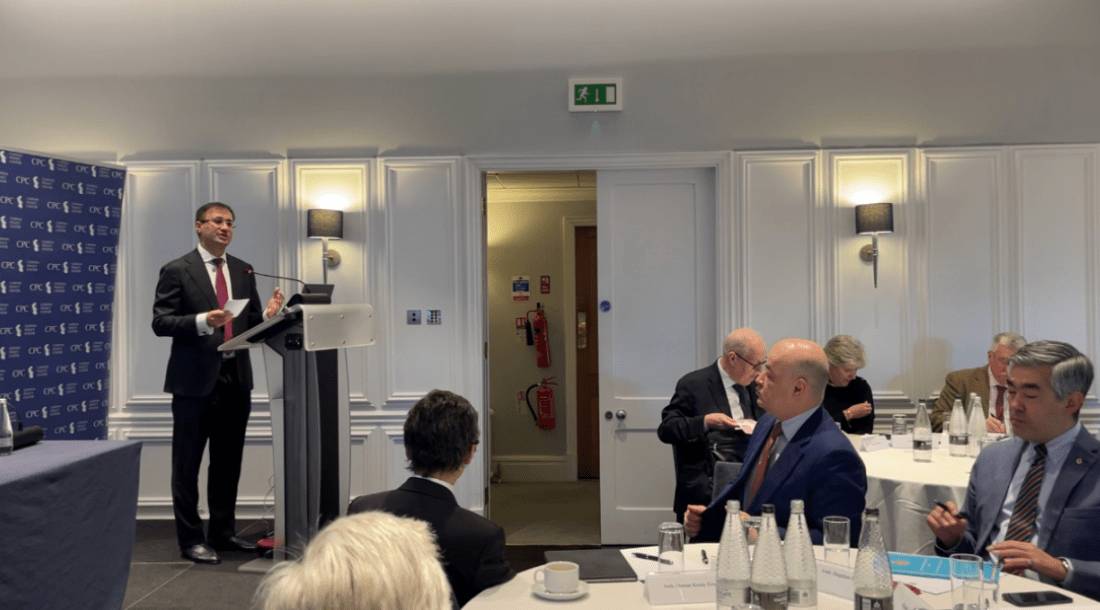 Efgan Nifti, President of the CPC, welcomed participants and guests to CPC’s third conference in London, while underlining the importance of the South Caucasus and Central Asia to world markets and supply chains. Nifti noted that connection and cooperation within the Caspian region are increasing, evidenced by 17 visits from Central Asian leaders to the South Caucasus and 16 reciprocal visits from South Caucasus leaders to Central Asia within the past year alone.
Efgan Nifti, President of the CPC, welcomed participants and guests to CPC’s third conference in London, while underlining the importance of the South Caucasus and Central Asia to world markets and supply chains. Nifti noted that connection and cooperation within the Caspian region are increasing, evidenced by 17 visits from Central Asian leaders to the South Caucasus and 16 reciprocal visits from South Caucasus leaders to Central Asia within the past year alone.
The CPC President highlighted the growing importance of energy security and environment as top priorities in the region: “The challenge of energy security is one of the issues that require common action. The Caspian region has played an important role in providing traditional energy resources, and looking into the future, it is poised to contribute to global energy security with sustainable, secure, and affordable clean energy.”
Nifti also mentioned opportunities that arose from the Climate Summit’s results. “COP29 gave a platform for Caspian countries to show their commitment to energy transition, renewable energy, and tackling global challenges,” he added. The CPC President then spoke on some of the significant agreements reached within the past year in the region, including natural gas and clean energy from the region to Europe, such as the Black Sea Electricity Cable.
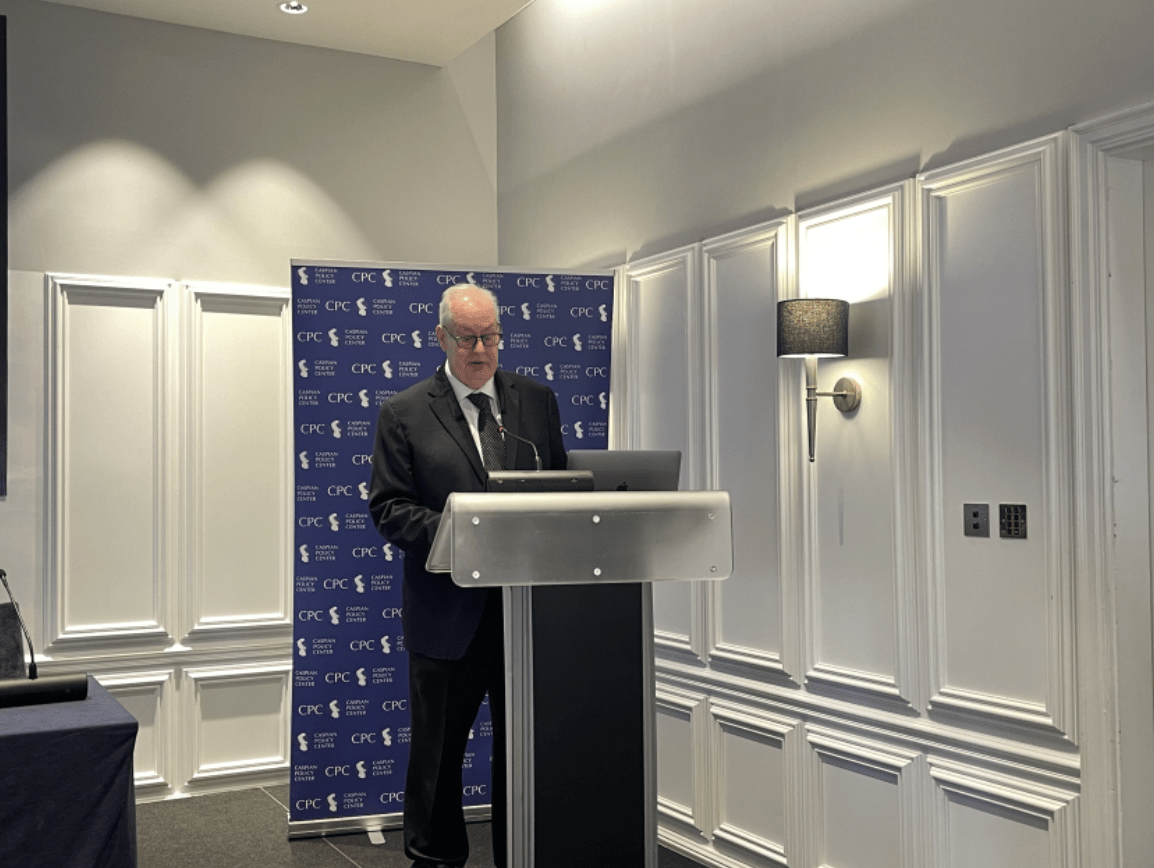 David Moran, CPC’s United Kingdom (UK) advisor, gave opening remarks and thanked the International Institute for Strategic Studies for the use of their venue. Moran mentioned the U.K.’s strategic importance for the further development and strengthening of the Caspian region.
David Moran, CPC’s United Kingdom (UK) advisor, gave opening remarks and thanked the International Institute for Strategic Studies for the use of their venue. Moran mentioned the U.K.’s strategic importance for the further development and strengthening of the Caspian region.
Drawing from his experience at COP29, Moran further emphasized the importance of the conference for global climate action: “There was an enormous amount of intellectual investment and lots of conversations on creative finance, whether it’s looking at blended finance or insurance.
“British climate leadership made a big difference at COP29 with its high ambition and constructive diplomacy. COP29 was the ‘Caspian COP’, demonstrating the determination of Central Asia and South Caucasus countries to work together for climate action. It opened many eyes around the world.”
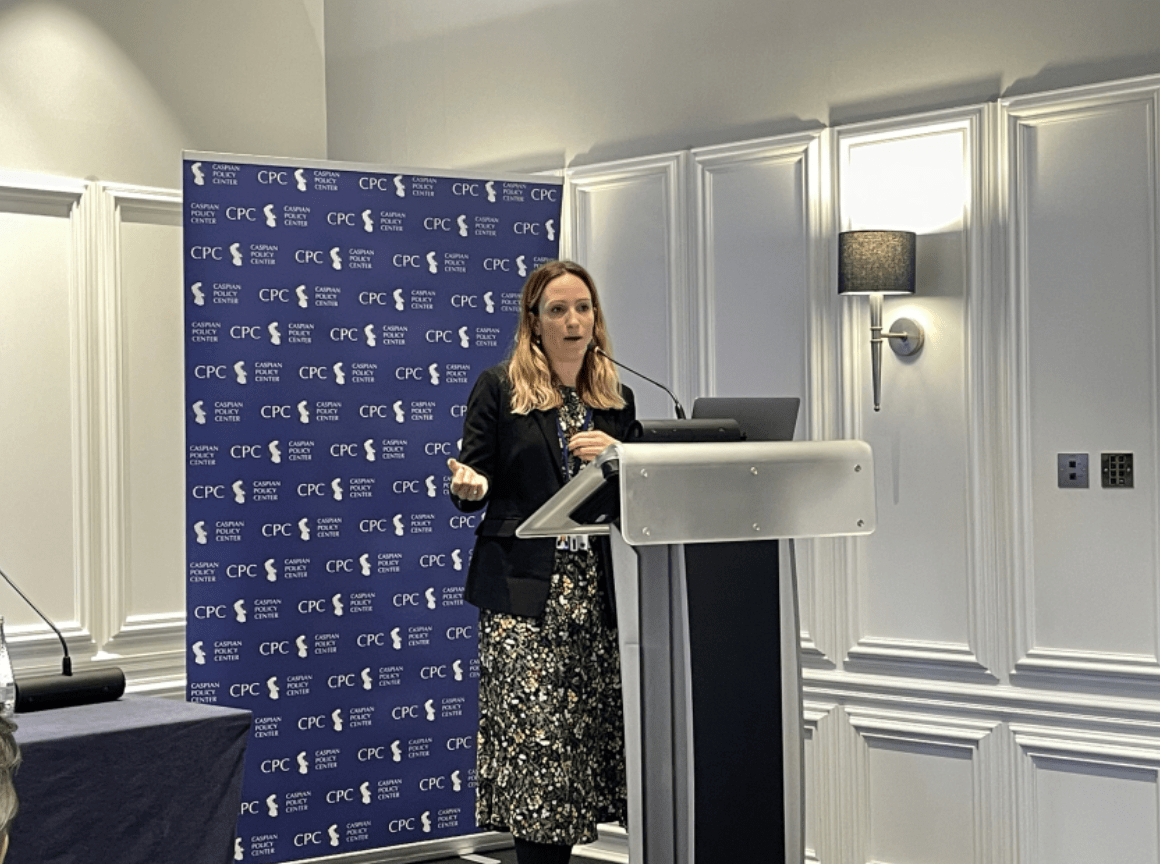 Sophie Westlake, Deputy Director for the U.K. government's International Energy Unit, which spans across the Foreign, Commonwealth and Development Office (FCDO) and the Department for Energy Security and Net Zero (DESNZ), delivered the keynote remarks. Westlake detailed the U.K.’s approach to energy security, and the role the Caspian Region can play, stressing the important role that the Caspian region’s gas played in Europe, in terms of energy security and diversification away from Russian supplies. “We have seen that role increasing and the role Azerbaijan plays in diversifying that supply,” she emphasized.
Sophie Westlake, Deputy Director for the U.K. government's International Energy Unit, which spans across the Foreign, Commonwealth and Development Office (FCDO) and the Department for Energy Security and Net Zero (DESNZ), delivered the keynote remarks. Westlake detailed the U.K.’s approach to energy security, and the role the Caspian Region can play, stressing the important role that the Caspian region’s gas played in Europe, in terms of energy security and diversification away from Russian supplies. “We have seen that role increasing and the role Azerbaijan plays in diversifying that supply,” she emphasized.
“We have seen the important role of the Caspian region in energy security and gas, but we want to see further cooperation on green energy in the future… There are about 845 gigawatts of energy potential in the Caspian Sea, that is massive potential there for the export of green power to Europe - that is the growing area of interest,” said Westlake.
She further emphasized the role of the U.K. as a global leader in energy transition: “At the G20 this year my PM launched the global clean power alliance. It is an idea of how we can take forward the initiative we have in the UK to a global level. The things we want to focus on going forward is how we use the funds that are available to better leverage private sector money and see that those funds are used in the best way.”
“What we want to do is ensure that while we continue to rely on gas, we are keen to focus as much as possible on how to make that as low as possible. We are keen to cooperate with the region to see what we can do to really dig in and focus on that issue,” she concluded.
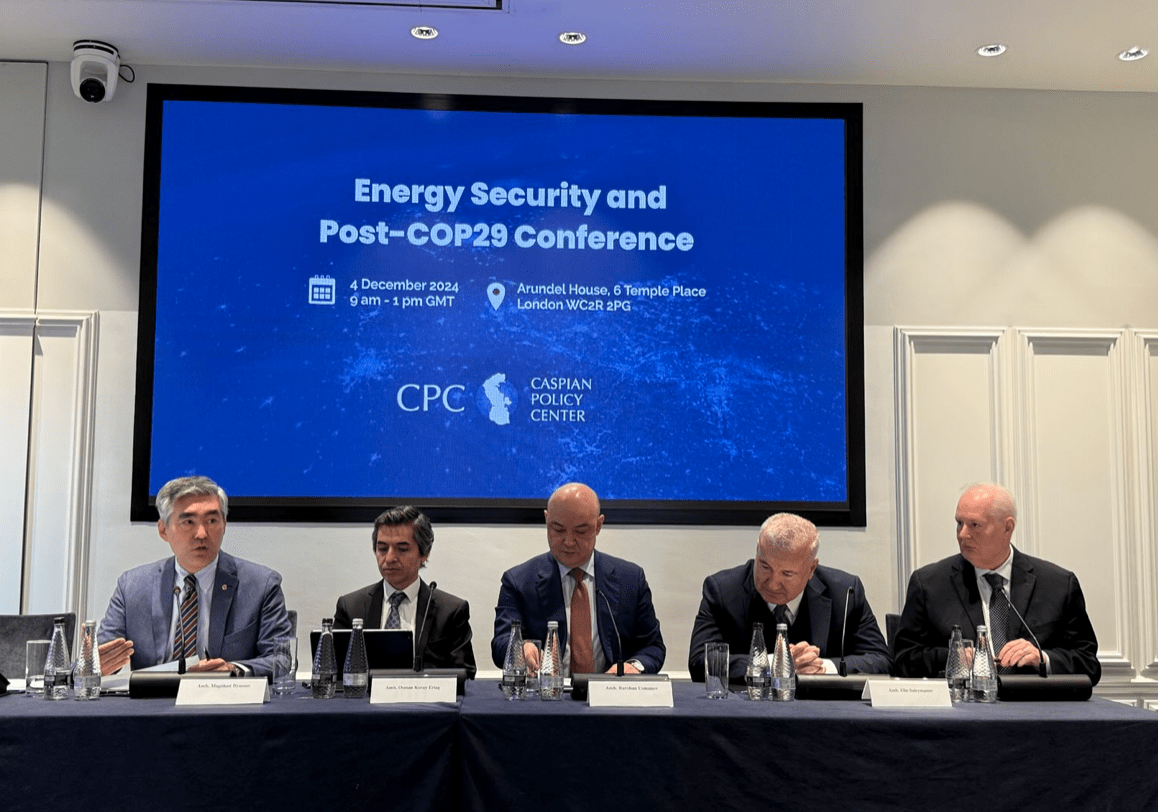 Following Westlake’s keynote address, David Moran introduced the ambassadorial panel, which included remarks from the Ambassadors of Azerbaijan, Kazakhstan, Türkiye, and Uzbekistan to the UK.
Following Westlake’s keynote address, David Moran introduced the ambassadorial panel, which included remarks from the Ambassadors of Azerbaijan, Kazakhstan, Türkiye, and Uzbekistan to the UK.
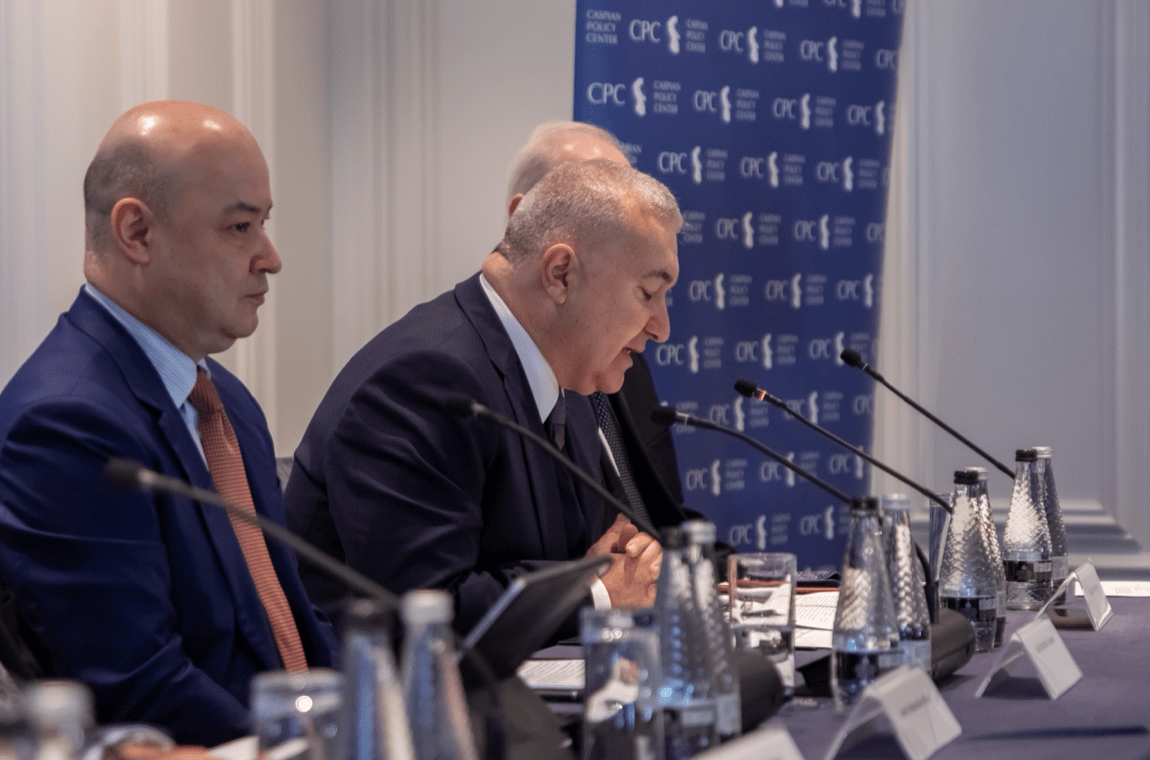 Commenting on Azerbaijan’s COP29 Presidency, Ambassador of Azerbaijan to the UK Elin Suleymanov said, “The most important thing is, despite all the distractions and geopolitical challenges, I think the parties to the conference and Azerbaijan's conference presidency have managed to keep its focus on the most important challenge, which is climate change.” Suleymanov also mentioned that the climate conference was seen “as a regional effort, a Caspian COP.” Specifically, Ambassador Suleymanov spoke on some of the achievements of COP29, including the $300 billion climate financing agreement: “For the last 15 years, that discussion has been happening, and no outcome was reached. Now it has, and it was reached in Baku, which is very important.”
Commenting on Azerbaijan’s COP29 Presidency, Ambassador of Azerbaijan to the UK Elin Suleymanov said, “The most important thing is, despite all the distractions and geopolitical challenges, I think the parties to the conference and Azerbaijan's conference presidency have managed to keep its focus on the most important challenge, which is climate change.” Suleymanov also mentioned that the climate conference was seen “as a regional effort, a Caspian COP.” Specifically, Ambassador Suleymanov spoke on some of the achievements of COP29, including the $300 billion climate financing agreement: “For the last 15 years, that discussion has been happening, and no outcome was reached. Now it has, and it was reached in Baku, which is very important.”
“For the first time, you see the institutional movement focusing on green transition in the region. That is not something that comes from the outside, it comes from the region itself,” he added.
Suleymanov also spoke on Azerbaijan’s as well as the Caspian region’s role in enhancing Europe’s energy security: “The Central Asia Trans-Caspian Green Energy Corridor — that is something that is fundamentally a game-changer in the region.”
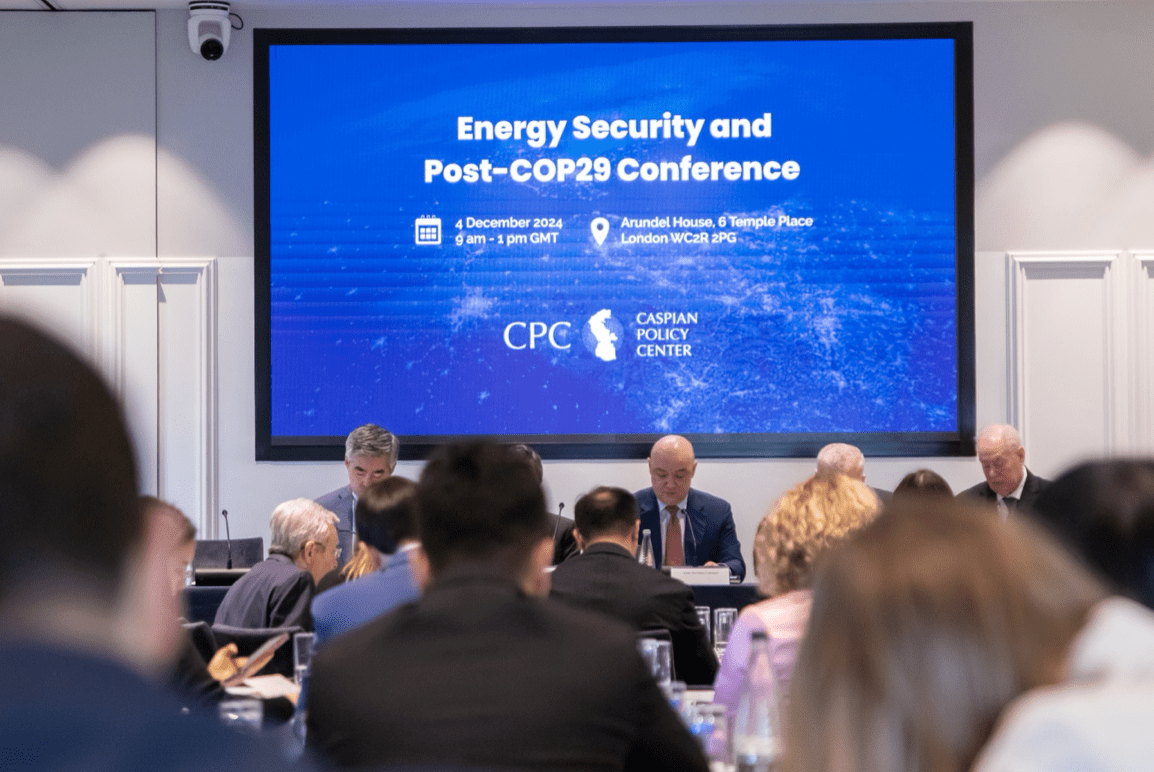
Ambassador of Uzbekistan to the UK Ravshan Usmanov pointed out the severity of climate change and its effects: “Today, climate change has emerged as the foremost global challenge contributing to increased geopolitical tensions. We feel these effects in Central Asia; climate challenges are becoming new obstacles to improving the quality of life for our nations.”
He further spoke on the efforts undertaken by his country in green energy transition, stating that, “Uzbekistan proposes the establishment of an international center for climate laws and damage assessment.”
“We are actively advancing projects in solar, and over the past five years, 38 agreements have been signed with international companies to construct a capacity of 21,000 megawatts. We plan to increase the share of green energy to 40 percent and global production of critical minerals must be increased 6-fold by 2040.”
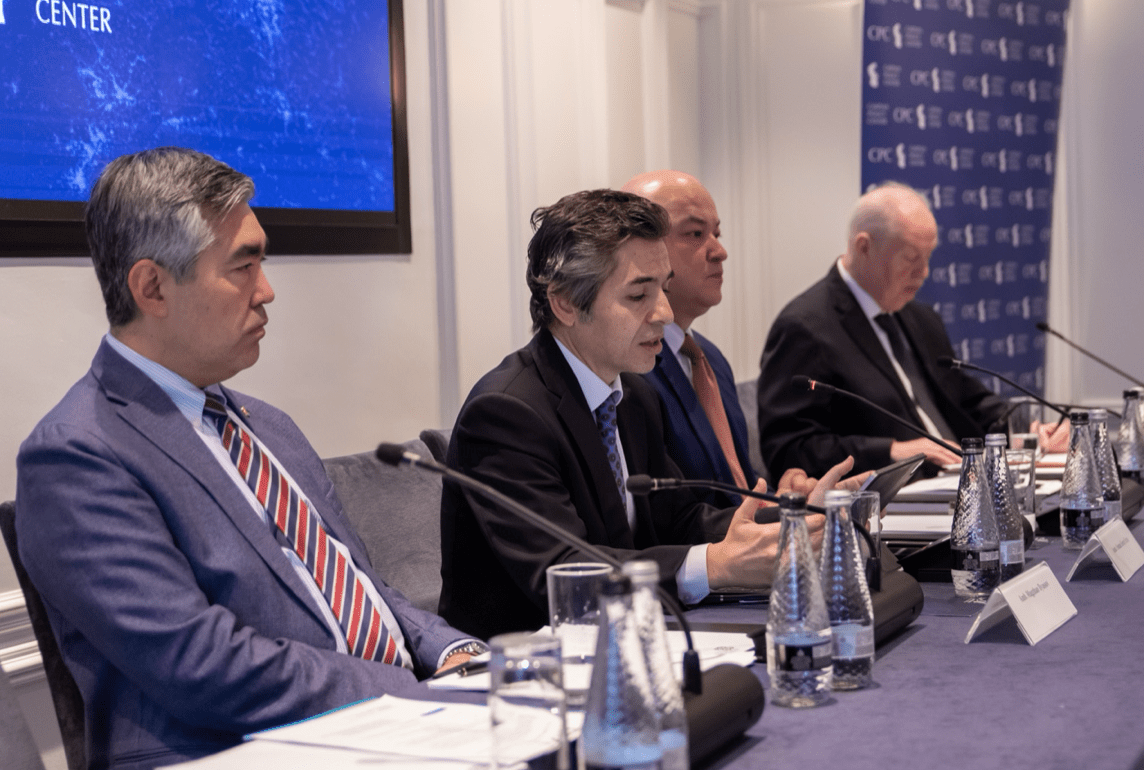
“It’s important to achieve a green energy transition without undermining the economy and energy security,” reflected Osman Koray Ertaş, the Ambassador of Türkiye to the UK.
“The picture is quite challenging. What we need is global motivation and global leadership on a green transition, as well as working harder on the financing aspects,” Ambassador Ertaş added. He also spoke of the importance for Türkiye to expand its use of renewable energy and to achieve energy security, especially with the help of Azerbaijan, Kazakhstan, and Uzbekistan.
“We continue to focus on energy security. We continue to support the energy security of our neighbors in south-eastern Europe. We have deals with Bulgaria, Hungary, Romania, Serbia,” he stressed.”
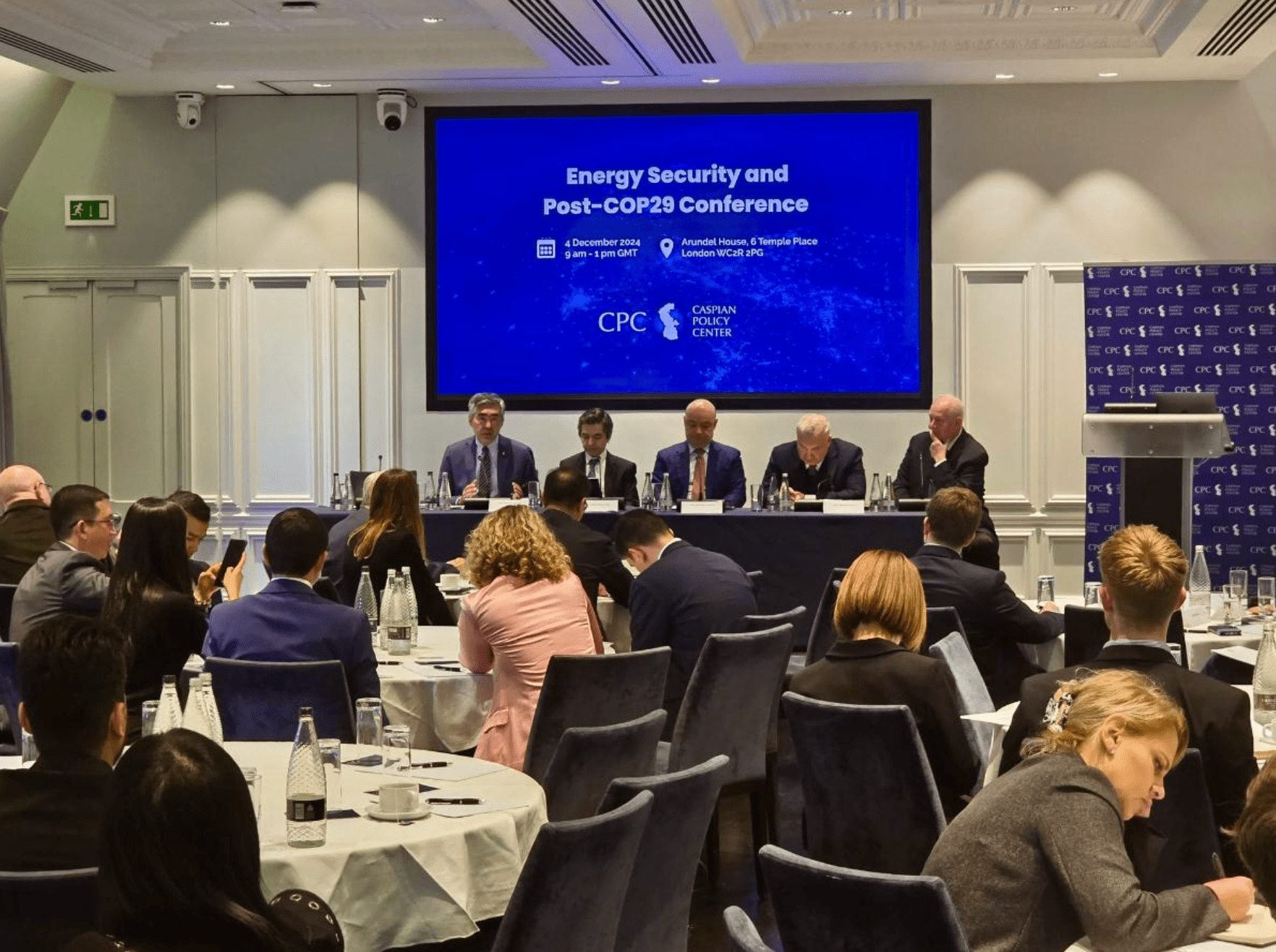 “COP29 gave the countries of the region a platform to show we are as committed to sustainable energy as the rest of the world, but we have our own challenges on the ground. We are working very hard to align our national capabilities with the general agenda,” said Magzhan Ilyassov, Ambassador of Kazakhstan to the U.K.
“COP29 gave the countries of the region a platform to show we are as committed to sustainable energy as the rest of the world, but we have our own challenges on the ground. We are working very hard to align our national capabilities with the general agenda,” said Magzhan Ilyassov, Ambassador of Kazakhstan to the U.K.
Speaking on Kazakhstan’s growing focus on energy security, Ilyassov further added: “It is important to diversify the energy mix in our country. The final pillar is to develop a range of low-carbon energy sources beyond solar and wind. I am talking about hydrogen, nuclear, and natural gas.”
“Energy security is increasingly regionalized, one big outcome for us is we become stronger and better aware of ourselves as a sustainable energy-related region. We can support each other by working together,” concluded Ambassador Ilyassov.
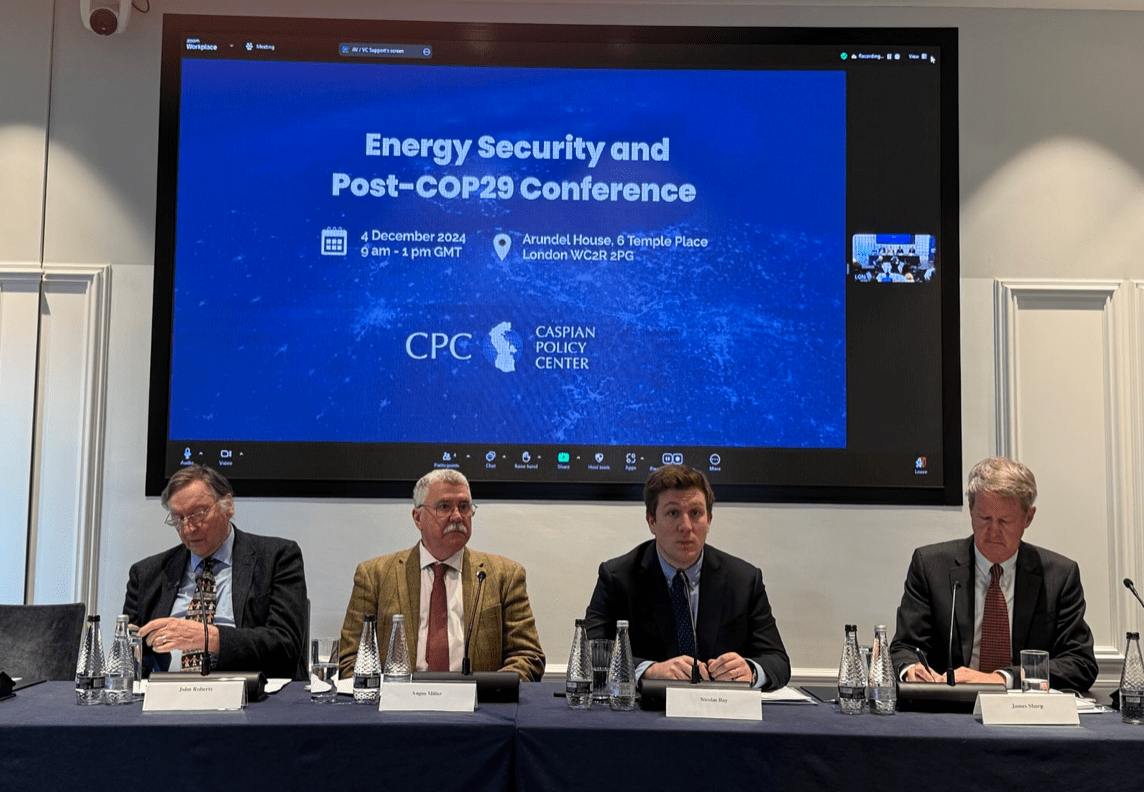 The next panel focused on energy security challenges and strategic cooperation and was moderated by CPC board member James Sharp. Speakers Included: Nicolas Ray, Energy Counsellor of the E.U. Delegation to the UK; John Roberts, Energy Security Specialist at Methinks Ltd, and Angus Miller, Chairman of TelosNRG.
The next panel focused on energy security challenges and strategic cooperation and was moderated by CPC board member James Sharp. Speakers Included: Nicolas Ray, Energy Counsellor of the E.U. Delegation to the UK; John Roberts, Energy Security Specialist at Methinks Ltd, and Angus Miller, Chairman of TelosNRG.
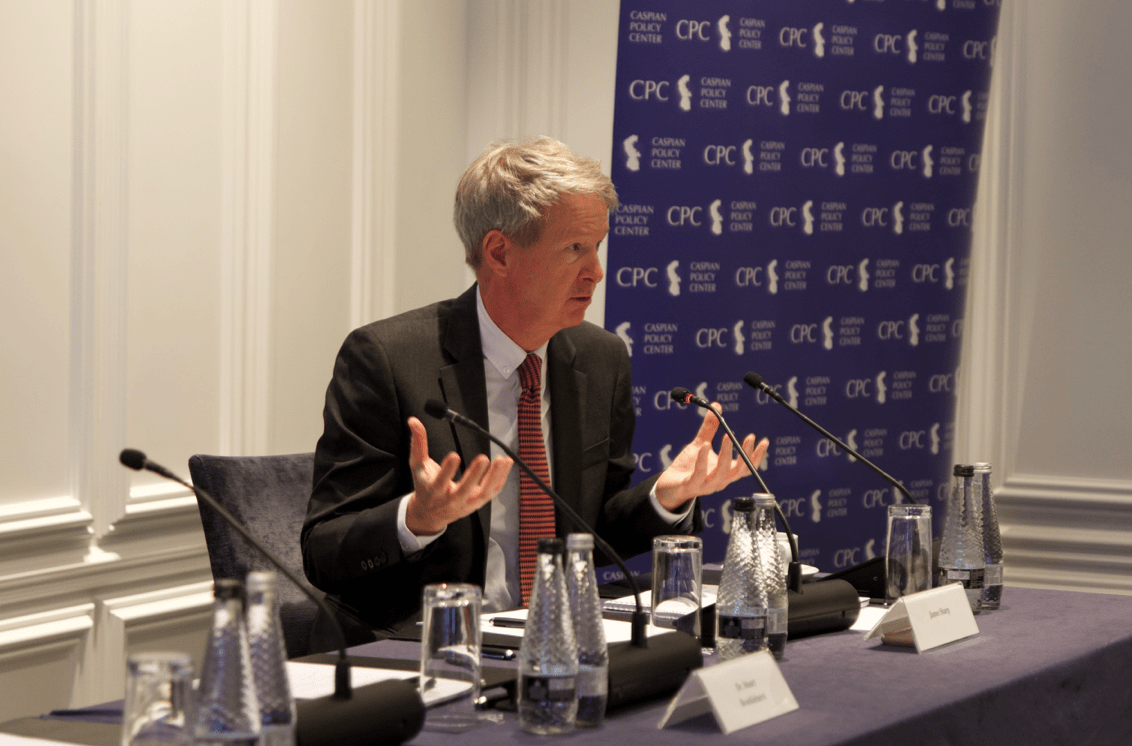 James Sharp, board member of CPC, kicked off the panel by stressing that despite the global ambition for tackling climate change and energy security, the approaches taken by leading actors have been met with some controversy, including in the UK.
James Sharp, board member of CPC, kicked off the panel by stressing that despite the global ambition for tackling climate change and energy security, the approaches taken by leading actors have been met with some controversy, including in the UK.
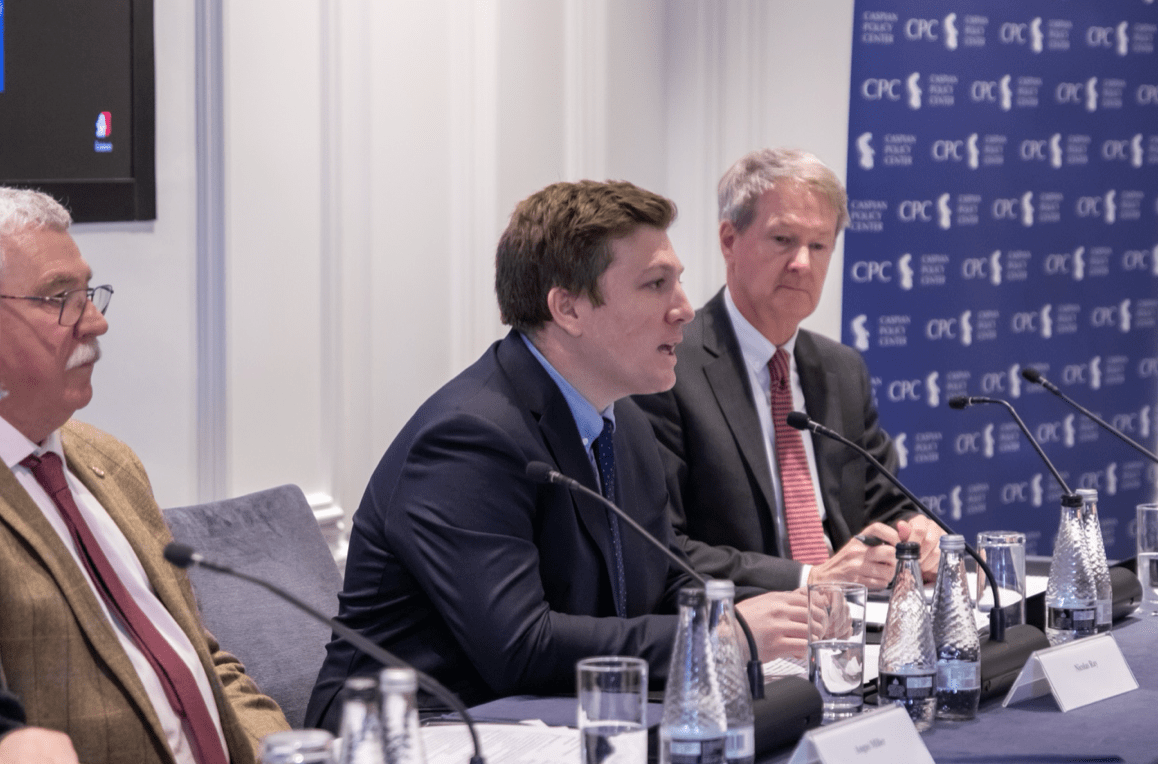 Speaking on the E.U.’s rapid reaction to enhance European energy security following Russia’s invasion of Ukraine, Energy Counsellor of the EU Delegation to the UK Nicolas Ray said: “We have reduced the share of gas imports from Russia from 45 percent to 15 percent in 2023, and even less this year… When it comes to diversification, I have to emphasize the role played by the U.K. with the U.K. quadrupling its imports of gas to the E.U.”
Speaking on the E.U.’s rapid reaction to enhance European energy security following Russia’s invasion of Ukraine, Energy Counsellor of the EU Delegation to the UK Nicolas Ray said: “We have reduced the share of gas imports from Russia from 45 percent to 15 percent in 2023, and even less this year… When it comes to diversification, I have to emphasize the role played by the U.K. with the U.K. quadrupling its imports of gas to the E.U.”
He further added: “The Caspian region is very important when it comes to the diversification strategy of the E.U. The Caspian Sea has tremendous potential for wind. Having this diversification helps that when there is an issue, and a source [of energy] has to be cut off, we have other sources. The wake-up call for this was Russia's invasion of Ukraine.”
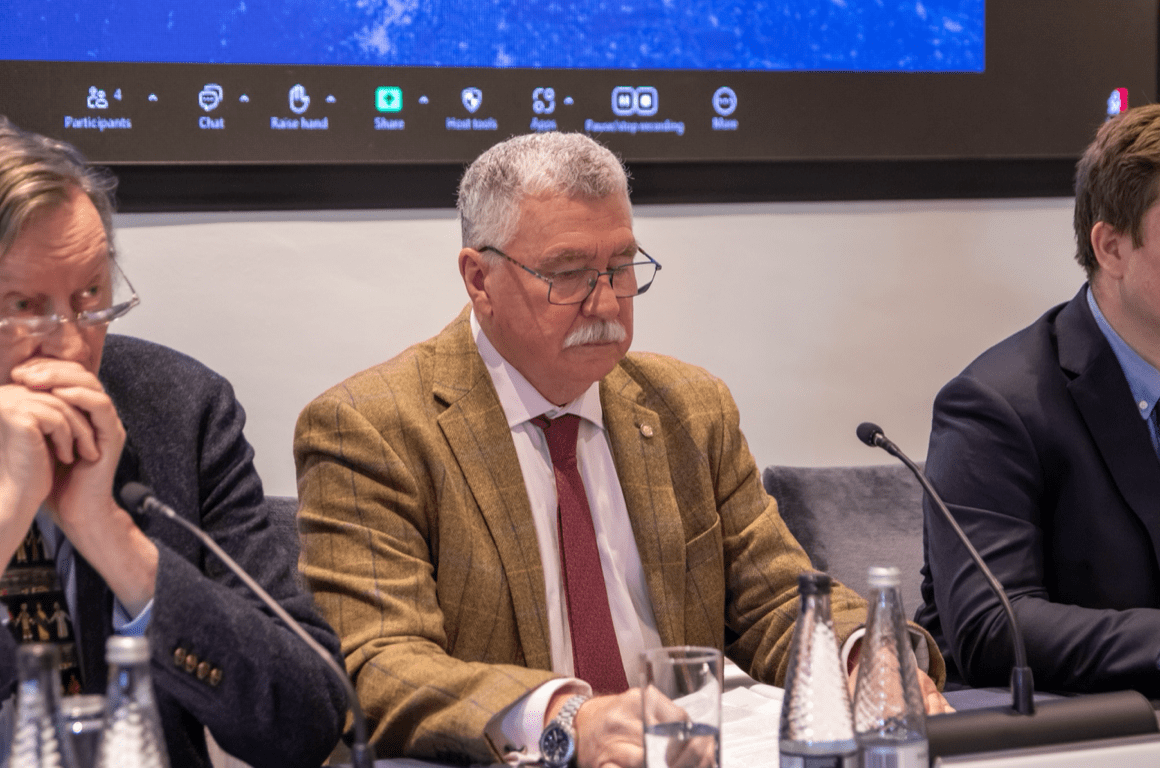 Angus Miller, Chairman of TelosNRG, spoke on the rise of energy nationalism. He noted that, “It's great to hear about the idea of states working together, but what I'm seeing in Europe is states not working together and following their own path.” In this line, he mentioned that several factors such as political and military uncertainty, situation in Ukraine, the rise of populism in Europe have become major challenges for global coordination on energy transition.
Angus Miller, Chairman of TelosNRG, spoke on the rise of energy nationalism. He noted that, “It's great to hear about the idea of states working together, but what I'm seeing in Europe is states not working together and following their own path.” In this line, he mentioned that several factors such as political and military uncertainty, situation in Ukraine, the rise of populism in Europe have become major challenges for global coordination on energy transition.
Speaking on the Caspian region, Miller added that the region has a “short gap remaining in which to provide hydrocarbons.” With the growing attention to nuclear energy by the U.K. and other governments, Miller argued that the fact that uranium is available in Central Asia is a positive development.
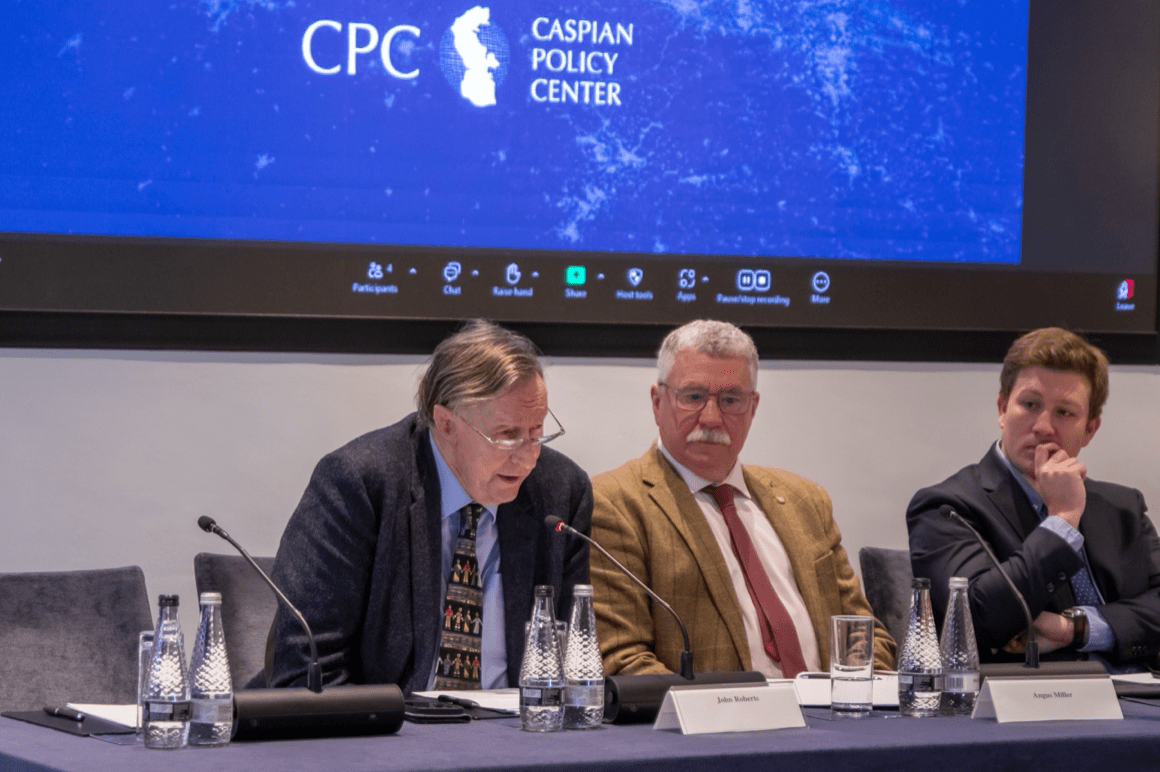 In light of Russia’s invasion of Ukraine, Europe, including the U.K., worked hard to increase energy efficiency, speed the transition towards renewables and diversify sources. Looking ahead on the energy transition path forward, John Roberts, Energy Security Specialist at Methinks Ltd, stated, “Climate change will hit everyone, but not equally. The world will need not just more energy security but also energy-storage facilities.”
In light of Russia’s invasion of Ukraine, Europe, including the U.K., worked hard to increase energy efficiency, speed the transition towards renewables and diversify sources. Looking ahead on the energy transition path forward, John Roberts, Energy Security Specialist at Methinks Ltd, stated, “Climate change will hit everyone, but not equally. The world will need not just more energy security but also energy-storage facilities.”
Roberts also touched on the Caspian region’s vast renewable energy potential, and the steps needed to be taken to export these resources to Europe. “In the next two years, close to 1.3 gigawatts are currently under development. Azerbaijan is proposing to add at least four gigawatts of capacity, for which real investments are being made. When it comes to their giant project — two gigawatts of offshore wind, potentially even six — where is that going to go? That has to go to export.”
“Given the current political situation in Georgia, which the Trans-Caspian Green Corridor runs through, a highly theoretical alternative is using the Zangezur Corridor, passing Armenia and going straight through Turkey,” Roberts stated.
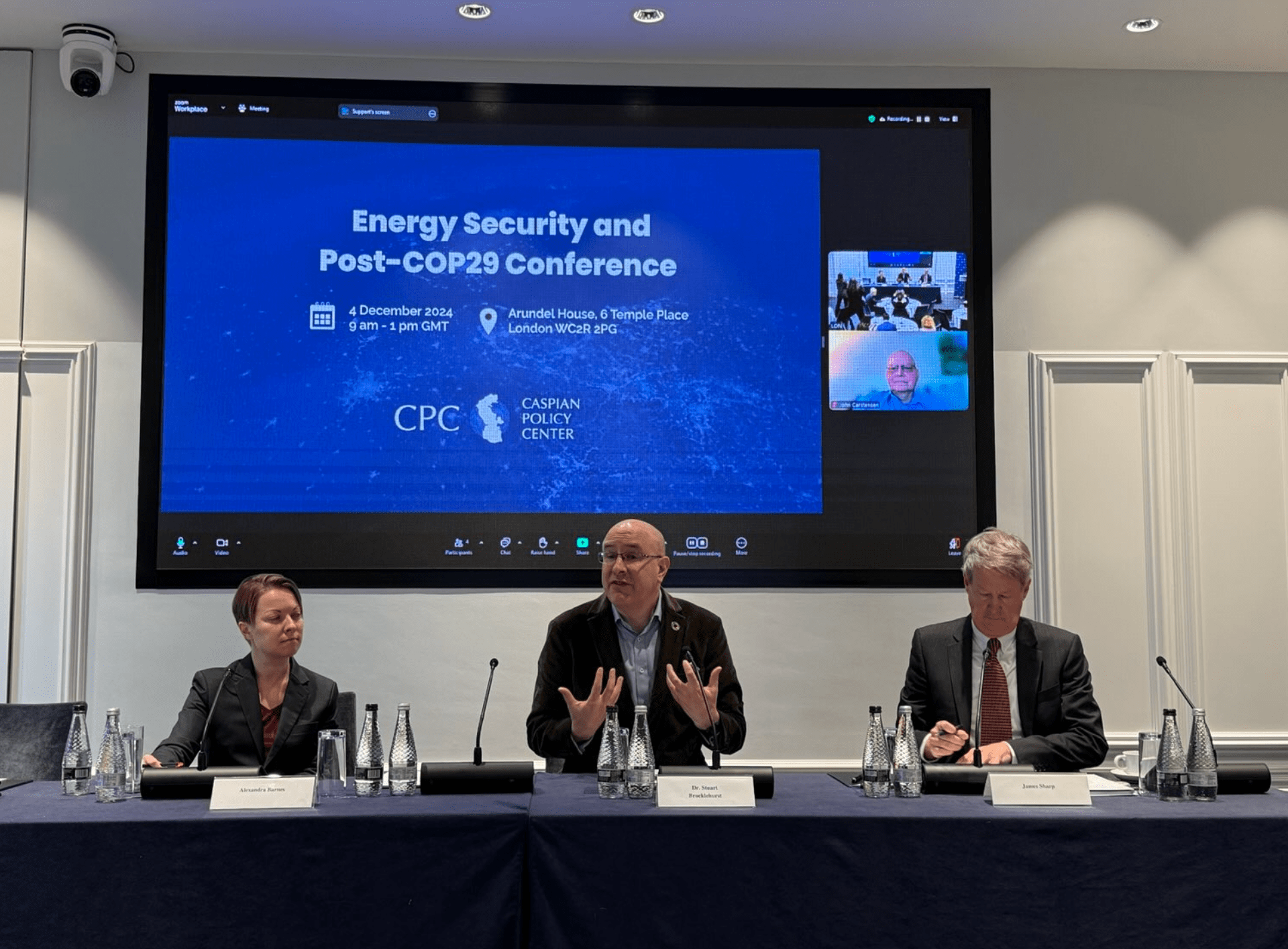 The second panel, “COP29 Outcomes: Implications for the Caspian Region and the World”, focused on the challenges and opportunities that have arisen from the results of the recent COP29 Climate Summit. Moderated by James Sharp, the discussion included insights from Dr Stuart Brocklehurst, Deputy Vice-Chancellor for Business Engagement and Innovation at the University of Exeter, and Director of Green Future Solutions; John Carstensen, Fellow and Climate Resilience Lead at Mott MacDonald; and Alexandra Barnes, Director of Infrastructure, Climate, and Nature at British Expertise International.
The second panel, “COP29 Outcomes: Implications for the Caspian Region and the World”, focused on the challenges and opportunities that have arisen from the results of the recent COP29 Climate Summit. Moderated by James Sharp, the discussion included insights from Dr Stuart Brocklehurst, Deputy Vice-Chancellor for Business Engagement and Innovation at the University of Exeter, and Director of Green Future Solutions; John Carstensen, Fellow and Climate Resilience Lead at Mott MacDonald; and Alexandra Barnes, Director of Infrastructure, Climate, and Nature at British Expertise International.
Speakers in this panel discussed the steps needed to be taken in the Caspian region in order to accelerate the green energy transition process.
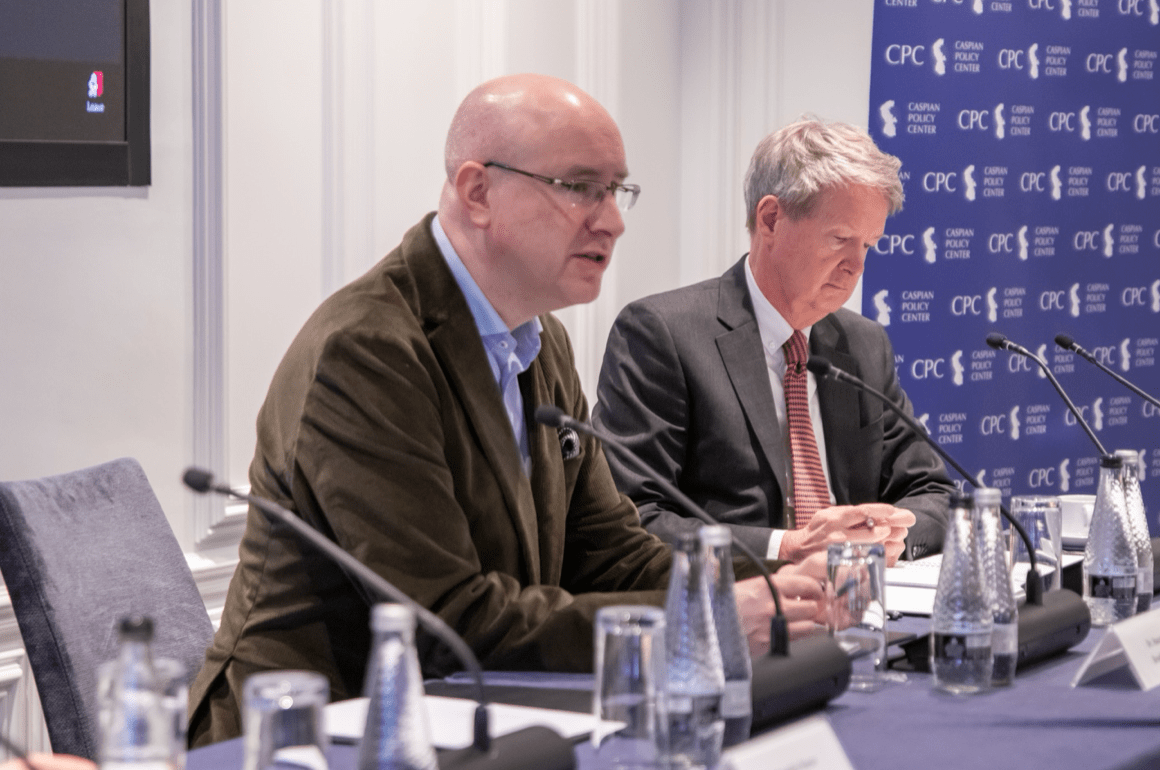 Dr Stuart Brocklehurst, Deputy Vice-Chancellor for Business Engagement and Innovation at the University of Exeter, and Director of Green Future Solutions, spoke on the organization of the COP29 conference. “Baku saw a very large number of business leaders, political leaders, and business interests who would never normally go to the Caspian region. What they saw was an expertly organized event, with many people feeling they took away a warm impression of the country and the people. There were commercial contracts and investments agreed, and university-to-university links established,” Brocklehurst said.
Dr Stuart Brocklehurst, Deputy Vice-Chancellor for Business Engagement and Innovation at the University of Exeter, and Director of Green Future Solutions, spoke on the organization of the COP29 conference. “Baku saw a very large number of business leaders, political leaders, and business interests who would never normally go to the Caspian region. What they saw was an expertly organized event, with many people feeling they took away a warm impression of the country and the people. There were commercial contracts and investments agreed, and university-to-university links established,” Brocklehurst said.
Brocklehurst also explained how individual country plans for carbon emissions are setting the path forward regarding green energy transition. “The UK announcement at COP29 to cut its emissions 81percent by 2035, is a significant marker of their intentions… We are testing the upper bounds of climate models.”
Lastly, Brocklehurst warned about the rising effects of climate change that are felt globally, “This year, emissions from land use change rose by 4.6 percent after 10 years of decrease. We are in a dangerous moment. There are certain tipping points ahead, and if we pass those points, this goes out of our control.”
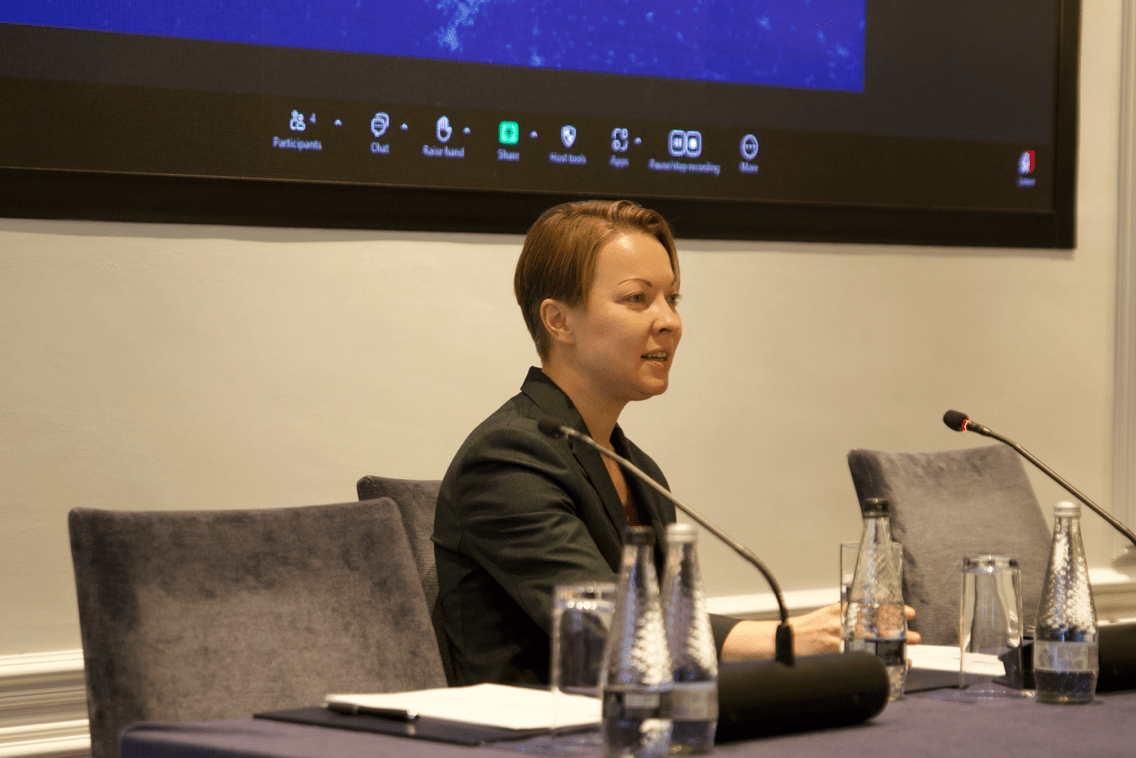 Alexandra Barnes, Director of Infrastructure, Climate, and Nature at British Expertise International, spoke from the point of view of the business community in the UK. Regarding the COP29 conference, Barnes said, “Many of our members traveled to the region or Baku for the first time ever. I think this increased international attention can definitely lead to investment, partnerships, and enhancing regional cooperation.”
Alexandra Barnes, Director of Infrastructure, Climate, and Nature at British Expertise International, spoke from the point of view of the business community in the UK. Regarding the COP29 conference, Barnes said, “Many of our members traveled to the region or Baku for the first time ever. I think this increased international attention can definitely lead to investment, partnerships, and enhancing regional cooperation.”
Barnes argued that the climate conference put the whole Caspian region in the global spotlight. “There is this need for knowledge sharing between the UK and the region. There is an opportunity to look at the interconnectedness between energy security and water security,” she added.
Barnes then commented on the future trajectory of climate financing, arguing that the young private-sector innovators and investors will make the difference for climate investment for the future. “Markets will need to develop new partnerships…it’s important for Europe to regularly send business representatives to the region to build new links,” she emphasized.
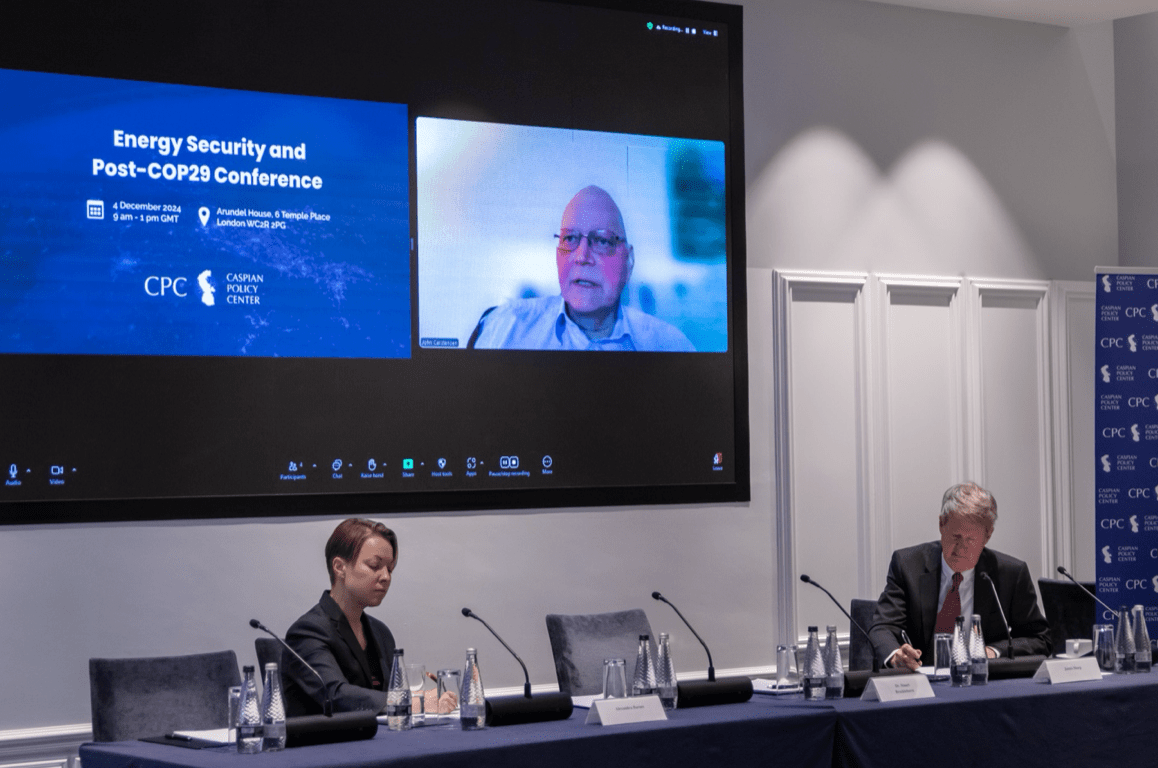
John Carstensen, Fellow and Climate Resilience Lead at Mott MacDonald, picked up on the importance of reducing energy costs and building energy resilience globally.
“Ahead of a political acknowledgment of the importance of dealing with climate change, that is where the biggest shift can arise: an increasing acknowledgment of the reality of climate change, whether or not there is a political agreement to deal with it in time.”
Carstensen argued that the outcome of COP29 for him was unsuccessful, “not because of the organizers or the location, but very much because some of the issues identified before have not been adequately addressed.
“There is not a desire from many of the developed nations to contribute the amounts needed. It is a failure because it doesn’t do what science says we need to do. Clearly, the motivation wasn’t there from the global community to push some of these agenda items even further.”
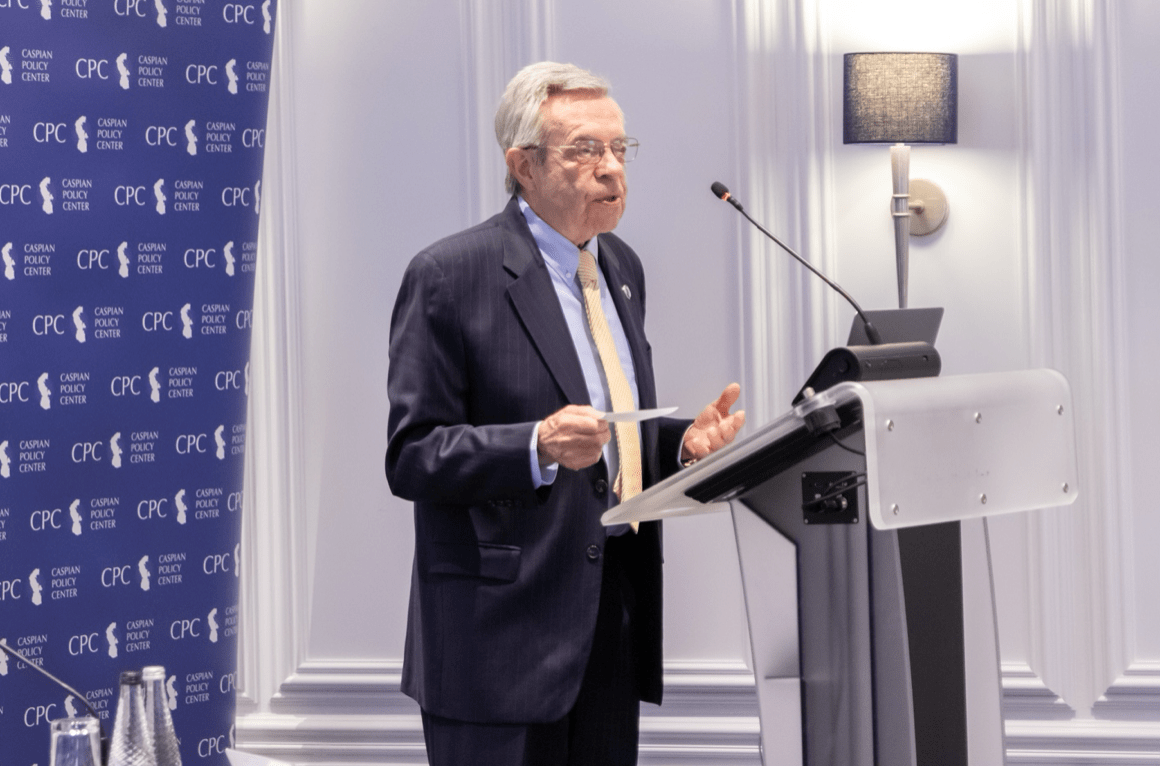 The conference concluded with closing remarks from Ambassador (ret.) Richard Hoagland, who underscored the importance of strategic partnerships and cooperative solutions to enhance energy and connectivity cooperation across the Caspian region, benefiting both the United States and the United Kingdom. Ambassador Hoagland reiterated that the Trans-Caspian Corridor, also known as the Middle Corridor, still needs significant hard infrastructure development and soft infrastructure improvements like compatible tariffs and simplified border controls. He concluded that the existing Central Asia 5 is already regularly adding Azerbaijan and should, sooner or later, include Armenia and Georgia to create a C8. The countries involved, now and in the future, should decide how to institutionalize this grouping with the understanding, “Stronger Together.”
The conference concluded with closing remarks from Ambassador (ret.) Richard Hoagland, who underscored the importance of strategic partnerships and cooperative solutions to enhance energy and connectivity cooperation across the Caspian region, benefiting both the United States and the United Kingdom. Ambassador Hoagland reiterated that the Trans-Caspian Corridor, also known as the Middle Corridor, still needs significant hard infrastructure development and soft infrastructure improvements like compatible tariffs and simplified border controls. He concluded that the existing Central Asia 5 is already regularly adding Azerbaijan and should, sooner or later, include Armenia and Georgia to create a C8. The countries involved, now and in the future, should decide how to institutionalize this grouping with the understanding, “Stronger Together.”